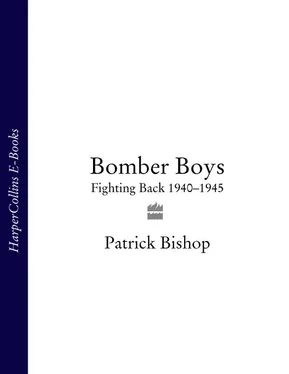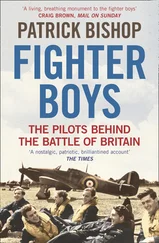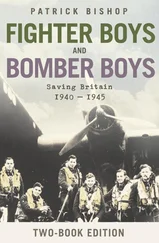The Nazis were to good as a black hole is to light. The effects of British and American bombing on Germany and the lands the Germans conquered were dreadful and it is right that they should be recorded and remembered. But the Allies’ real crime would have been to hold back from using any of the means at their disposal to destroy Hitler and those who sustained his war.
The argument over exactly what Bomber Command achieved will never be settled. One undeniable success, an awkward one to acknowledge nowadays, is that it altered Germany’s personality. Saturation bombing may not, as intended, have broken the Germans’ spirit. But it helped powerfully to bring about their post-war conversion to peaceful democracy.
History in its current mood has paid limited attention to the ethos and character of the men who fought this most extraordinary war. This book sets out to correct that imbalance. It is for, and about, Perkins. In the process I want also to redress a wrong. There is no national memorial to the men of Bomber Command, no one place where their sacrifice and contribution to victory are properly and thankfully commemorated. I hope that Bomber Boys will mark a first step in changing that.
Introduction After the Whirlwind
No one who saw what Allied bombing did to Germany forgot it. A traveller in an official delegation passing through Berlin two months after the German surrender noted in his diary: ‘Berlin … is ghastly. I could never have believed how complete the destruction is. We covered [about five miles] and saw less than a dozen undamaged houses and not one in ten was anything more than a burned-out shell.’
Soon afterwards he visited Potsdam, less than twenty miles to the west. ‘Bert Harris removed the town of Potsdam in half an hour one night in April,’ he wrote. ‘I have never seen anything so complete … the usual procession of handcarts, prams etc. and the same slab-faced people as in Berlin.’
The sight, he felt, was the finest possible lesson to the Germans of the folly of initiating wars. Yet he ‘came away feeling very sorry for these people and when I eventually said so I found all the others felt just the same.’ 1
The man who wrote these words had played a central part in creating the scenes he witnessed. He was Marshal of the Royal Air Force Sir Charles Portal, who as Chief of the Air Staff had overseen the bombing campaign. ‘Bert Harris’ was his subordinate, Air Marshal Sir Arthur Harris, the head of Bomber Command who had put Allied strategic theories into devastating practice.
A little afterwards, a veteran pilot who had taken part in many of the raids flew over some of the areas he had bombed. ‘It was a fine clear day and we flew at 4,000 feet,’ wrote Peter Johnson, ‘a good height for an overall view and we saw as we passed something of what had happened to, amongst others, Hamburg, Lübeck, Hanover, the Ruhr towns, Cologne, Aachen and Düsseldorf and so south to Stuttgart, Nuremberg and Munich … the general devastation was almost unbelievable. In town after town hardly a building seemed to be intact, hardly a house seemed to be habitable. All that showed from the air were rows and rows of empty boxes, walls enclosing nothing … the whole area was, for the time being at least, dead, dead, dead.’
Johnson could not help wondering ‘whether this truly dreadful sight represented a degree of overkill, whether such destruction had really been necessary to stop the production of arms for the Nazis in the greatest industrial complex in Europe.’ He reassured himself with the thought that even when the Ruhr was encircled by Allied forces the German people ‘were still obeying Hitler’s frenzied calls for resistance to the last man.’ 2
The debris was to hang around accusingly for years. In March 1949 the American diplomat George Kennan returned to Hamburg where he had served in pre-war days. He visited the large residential districts east of the Alster. ‘Here was sweeping devastation, down to the ground, mile after mile,’ he wrote. ‘It had all been done in three days and nights in 1943, my host told me. Seventy-five thousand persons had perished in the process. Even now, after the lapse of six years, over three thousand bodies were estimated to be buried there in the rubble.’ [The actual number of victims of the raids carried out on Hamburg between 27-30 July 1943 was closer to 40,000 dead.]
These sights demanded reflection, and justification or judgement. The natural response of most of those who planned or carried out the attacks was the same as Portal’s. The Germans, unquestionably, had started it. They had, as Harris predicted in a much-repeated proverb, sown the wind and reaped the whirlwind. Kennan, however, felt differently. For the first time since the war ended, he wrote, ‘I felt an unshakeable conviction that no momentary military advantage – even if such could be calculated to exist – could have justified this stupendous, careless destruction of civilian life and of material values, built up laboriously by human hands over the course of centuries for purposes having nothing to do with this war. Least of all could it be justified by the screaming non-sequitur, “They did it to us.”’ 3
The debate over the morality of all-out aerial bombardment had been under way long before the strategic air campaign began and would rumble through the post-war years to the present day. But the first reaction of those who gazed across the haunted mounds of rubble that were all that remained of scores of German city centres was simple awe at the destruction that had been wrought. The onlookers thought they knew what a blitzed town looked like. The results of what bombs did were on display in many of Britain’s major cities. But none of them looked like this.
During the war Bomber Command had been a priceless asset to government propaganda, as a symbol of Britain’s resolve and its willingness and ability to take the war to the enemy. Its actions were thoroughly publicized and its pilots and crewmen ranked as heroes. It fought a continuous campaign from the first day of the war to the last, interrupted only by the weather. The enormous effort and the great sacrifice of life this entailed were honoured and the destruction done to the enemy was presented as a vital element in the victory. In peacetime, the wrecked towns and the grave pits filled with the bones of civilians became an embarrassment and the Bomber Boys faded from the official legend. On the afternoon of 13 May 1945 Churchill broadcast his Victory in Europe speech. There was praise for everyone who had contributed to the war effort. But apart from an allusion to the damage done to Berlin, the main activities of the bomber crews were barely mentioned. There were campaign medals for those who had fought in Asia, the Middle East and Europe. There was to be no specific award for the men who had set about dismantling Hitler’s empire from the air.
The public memory of the air war was selective. People seemed inclined to consign the bombing campaign and those who had fought it to the past. The pilots of Fighter Command, however, had a special place in the post-war consciousness. Scores of books were written by them and about them. Men like Douglas Bader, Bob Stanford Tuck and ‘Sailor’ Malan were celebrities. They were The Few and the battle that they fought was relatively short, roughly four months from the beginning of July to the end of October 1940. The men who crewed the bombers were The Many and their struggle went on and on. Of the 125,000 who passed through the fire, only Guy Gibson and Leonard Cheshire won any lasting fame. Gibson had led the Dams Raid of May 1943, a feat of dash and daring, quite unlike the demolition work which Bomber Command conducted every night. Cheshire was known not so much for damaging people as for healing them, in the homes he set up after the war.
Читать дальше












